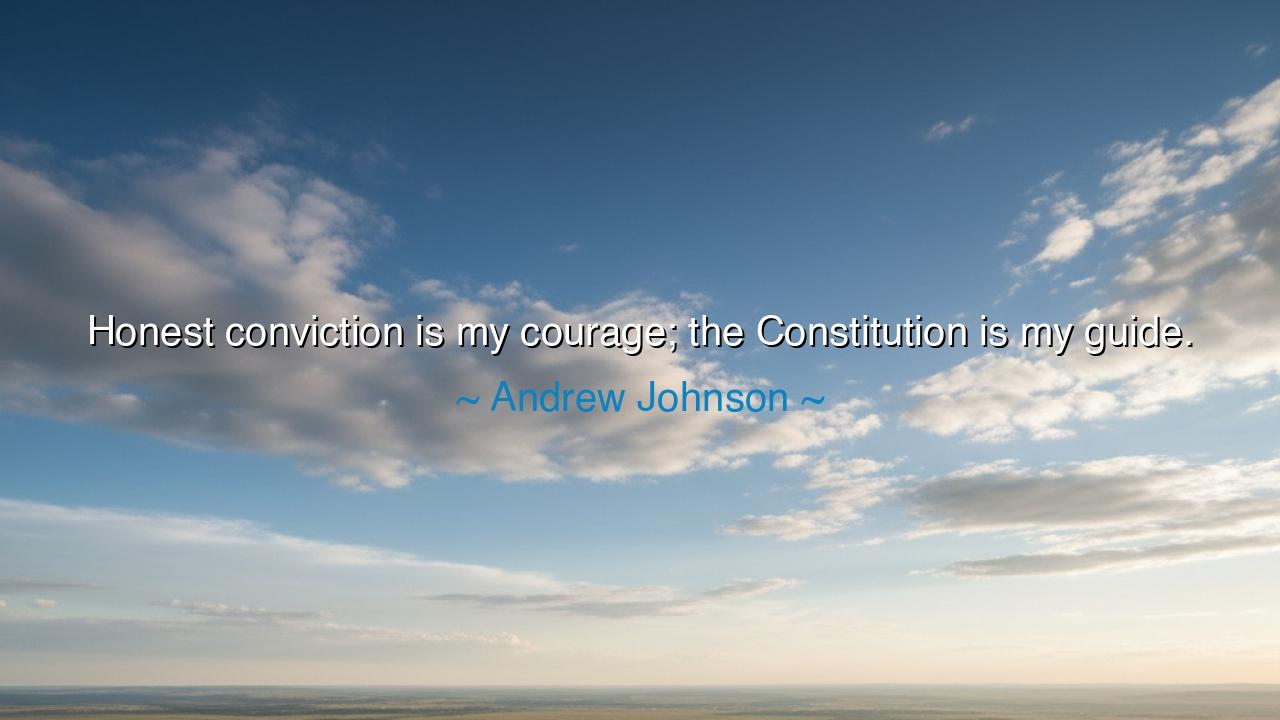
Honest conviction is my courage; the Constitution is my guide.






"Honest conviction is my courage; the Constitution is my guide." Thus spoke Andrew Johnson, the seventeenth President of the United States—a man forged in the fires of conflict, both political and personal. In these words, he binds two ancient virtues: conviction and law. One belongs to the heart; the other to the order of the world. Together, they form the compass of a soul that stands firm amidst chaos. For to live by conviction alone is to risk arrogance; to follow law alone is to risk blindness. But when the two unite—when the heart’s truth walks hand in hand with the nation’s guiding code—then courage becomes righteousness.
Born into poverty, Andrew Johnson rose from a tailor’s bench to the presidency in the aftermath of civil war. His path was not lit by privilege or comfort but by belief—the belief that a man’s worth lay not in birth but in integrity. When he spoke of honest conviction, he meant that inner flame that no crown or title can bestow. It is the courage to stand for what one deems right, even when the crowd turns hostile, even when power tempts the soul toward compromise. Yet Johnson also knew that conviction without restraint can become tyranny. Thus he declared his guide to be the Constitution, that enduring covenant between freedom and responsibility.
In the age of the ancients, such balance was called virtue—the golden mean between passion and reason. The Romans had their Cicero, who argued that a state must be governed not by the whims of men but by the rule of law. And yet Cicero, like Johnson centuries later, also knew that law itself must be animated by conscience. Without honest conviction, the Constitution is but parchment; without the Constitution, conviction may become chaos. To walk the path of justice, one must bear both—the inner fire and the outer order.
Consider, then, the moment of Johnson’s trial, when he faced impeachment by his own government. The nation was torn, still bleeding from civil strife. Many demanded vengeance, others mercy. Johnson stood before the storm, neither yielding to his enemies nor flattering his allies. He declared that his decisions were guided not by party or passion, but by his oath to the Constitution. He was nearly cast down, yet he stood unbroken, saying that courage is not defiance, but faithfulness to principle, even when it isolates the soul. Whether one agrees with his politics or not, there is power in the sight of a man standing upon conviction, willing to be judged by history itself.
Such courage is rare in any age. It demands the strength to listen first to the quiet voice of conscience, not the clamor of ambition. It demands the humility to let law and truth shape one’s path. Too often, men mistake pride for courage or stubbornness for conviction. But honest conviction is born of integrity, not ego. It is a courage that bows to truth rather than to power, that follows the guide of justice rather than the impulse of self-interest.
The lesson of Johnson’s words is as old as civilization itself: build your courage upon truth, and your actions upon law. Whether in the halls of power or the silence of personal struggle, let your convictions be honest—tested by wisdom, not by desire. And let your guide be that which transcends the moment: the principles that hold a society, a family, or a soul together.
So when you stand at the crossroads of decision, remember these twin stars: conviction and law. Feel within yourself the fire that speaks, “This is right,” but measure it against the greater order that preserves harmony. Be bold in spirit, yet humble before truth. For only then will your courage be pure and your path just. Honest conviction is my courage; the Constitution is my guide. May it also be yours—whether you govern a nation, a home, or your own heart.






AAdministratorAdministrator
Welcome, honored guests. Please leave a comment, we will respond soon